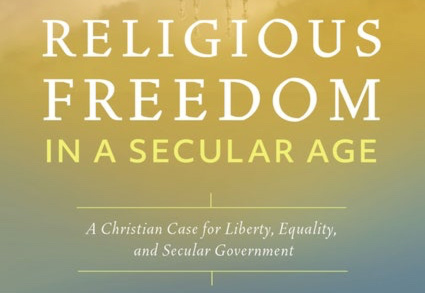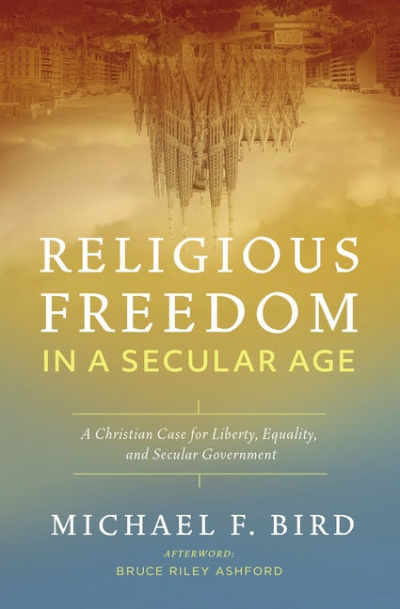
In an edited excerpt from his new book ‘Religious Freedom In A Secular Age’, MICHAEL F BIRD looks at what it is that makes Christians stand out from the crowd…
One of the biggest problems with the church in any age is that we imitate the world rather than imitate Jesus. If you read Paul’s letters to the church in Corinth, the believers there looked and acted more like the pagan culture of Corinth than imitators of Christ who were keeping in step with the Spirit. We could sum up the letters of John the elder by saying that Christians must be in the world but not of the world; for while we live in the world, we must not allow it to determine our beliefs, our way of life, or our values (I John 2:15–16).

“Know this: Christianity grew in the ancient world because it was weird – spectacularly weird, gloriously weird – and this weirdness is what made it so attractive.”
And yet the temptation in every setting is to take the values of our culture, whether progressive or conservative, baptise them in some Christian lingo, add a couple of Biblical proof texts, and presto, God is suddenly made into the image of our favourite political party and now sponsors all of our inherited presuppositions. Or else we find a way to justify acting in worldly ways and pursue the same hedonistic desires, embrace the same materialistic tendencies, absorb the same apathies, and enjoy the same pathetic pastimes as everyone else. We reach the tragic point where, if being a Christian were a crime, there would not be a shred of evidence to convict us.
That is tragic because what made Christians stand out in the ancient world was that they were different, peculiar, flat-out weird. They had religion, but without temple, sacrifices, or priesthood. They had hopes that did not rely on the power of the Roman Empire. They had ethics that affirmed Stoic ideals like self-mastery but also included notions like humility, which were somewhere between absurd and affronting to educated Romans who associated humility with servility. They had Jewish beliefs about God and creation, but it transcended the boundaries of the Jewish people and included Gentiles and barbarians as equals.
They were like an ancient club or association, but one in which masters and slaves called each other “brother” or “sister,” where women were entrusted with leadership and ministry, and where all were urged to make sure no one wronged or exploited a fellow believer. They believed it was better to suffer harm than to do harmful things to others. They believed that a Galilean peasant crucified by a second-rate Roman governor in the backwater province of Judea had been resurrected, enthroned in heaven, and was now installed as the King of kings and Lord of lords.
Know this: Christianity grew in the ancient world because it was weird – spectacularly weird, gloriously weird – and this weirdness is what made it so attractive. Russell Moore notes how we are strangers and exiles in this world, but he adds, “Our strangeness is only hopeful if it is freakishly clinging to the strange, strange mission of Christ crucified and risen”. Rather than try to make Christianity great again, we need to make Christianity weird again, and become a genuine alternative to the hedonistic despondency that characterises so much of our culture.
We rely on our readers to fund Sight's work - become a financial supporter today!
For more information, head to our Subscriber's page.
Christians are not different in terms of dress, ethnicity, or chosen vocation; we dress, talk, work, and eat just like everyone else. Yet what makes us different, sort of strange and wonderfully weird, is that the story of Jesus Christ drips off us like a toddler holding an ice-cream cone on a hot summer day. We believe the impossible: the dead shall be raised immortal, God is on the side of the poor rather than the prosperous, God helps those who cannot help themselves, evil doesn’t get the last laugh, and mercy is better than might.
We must also live impossible lives, things that don’t make sense, that seem counter-intuitive, a reversal of the norms, and even costly. We must therefore live as if God has made the impossible possible – has called us from darkness to light – by resisting the trinkets and temptations around us, and acting as if we really are a kingdom of priests, demonstrating the love of God in Christ to all without question. We must be, as the King James Bible puts it: a peculiar people (see Exodus 19:5).
If we are going to turn the world upside down, then we must be different to make a difference.
Taken from Religious Freedom in a Secular Age by Michael Bird Copyright © 2022 by Zondervan Used by permission of Zondervan. www.zondervan.com.
Michael F Bird is academic dean and lecturer in New Testament at Ridley College in Melbourne, Australia. He is the author and editor of more than 30 books including What Christians Ought to Believe, Seven Things I Wish Christians Knew about the Bible, and Evangelical Theology. He writes at michaelfbird.substack.com and can be followed on Twitter at @mbird12.





